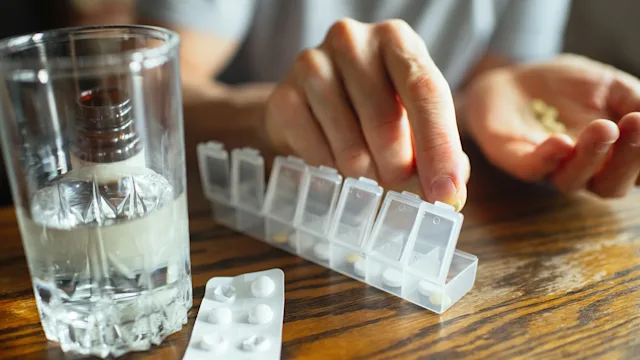Key takeaways:
Your kidneys are responsible for removing waste and extra water from the body. This includes getting rid of many medications through your urine.
Your kidney function can affect how certain medications are removed from the body. If you have kidney problems, you may not be able to clear these medications as effectively, causing them to build up in the body. Some medications can also increase the risk of kidney damage.
Your prescriber may perform blood tests to estimate your kidney function before you start a medication and periodically during treatment. The result can help determine if your medication dosage should be adjusted.
Do you ever wonder how your prescriber decides what medication dose you should take? The medication’s manufacturer will usually recommend a typical dose. But it may not be safe and effective for everyone. In this case, your prescriber may consider certain details, such as your age, when selecting the right dose for you. Another important factor is your kidney function.
Think of the kidneys as the recycling bins of the body. Their main task is getting rid of waste and excess fluid, as well as balancing electrolytes, such as sodium. They’re also responsible for removing many medications from the body.
So, why might a safe medication dose depend on your kidney health? And what happens if these renal dosing adjustments aren’t made? We answer these questions and more below.
Search and compare options
What role do the kidneys play in removing drugs from the body?
When you take a medication, it goes through several processes in your body. How it’s absorbed, distributed, and broken down are all important steps. But one process that shouldn’t be overlooked is how a medication is removed from the body after it has done its job. This is known as drug excretion.
For many medications, this step is where the kidneys come into play. Even though medications have beneficial effects in the body, the kidneys view them as substances that need to be removed. Once these medications reach your kidneys, they leave the body in your urine.
How do kidney problems affect drug clearance?
If you have kidney problems, your kidneys may not be able to work as efficiently. In this case, medications won’t be filtered out and removed from your body as easily. It may take longer for your body to remove the medication and pass it in the urine.
There are several factors that affect how well the kidneys remove certain medications from the body. Older age, hydration status (e.g., diuretic use and dehydration), and even some health conditions, such as heart failure, can affect kidney function.
How are medication dosages adjusted for people with kidney problems?
Not all medications need a different dose based on kidney function — also called renal dosing adjustments. But for those that do, healthcare professionals are able to make necessary adjustments before you start the medication and periodically during treatment. Renal dosing adjustments are often made based on your kidney function tests — more on that later.
Renal dosing adjustments usually involve lower recommended doses based on kidney function. For some medications, you may be instructed to take a dose less often. And if your kidney function falls below a certain level, you may be told to stop taking the medication.
Read more like this
Explore these related articles, suggested for readers like you.
Renal dosing adjustments are specific to each medication. They can help prevent a medication from building up in your body and increasing the risk of side effects. Some medications may be harmful to the kidneys, especially if you already have kidney problems. In this case, you may be prescribed at a lower dosage to reduce the risk of kidney damage.
Medications that may be adjusted based on kidney function
Below are examples of medications that may be adjusted based on your kidney function. Some have recommended renal dosage adjustments. Others may be prescribed at a lower dose as a precaution to lessen kidney damage if you have kidney problems.
While many of these medications require a prescription, some are available over the counter. Before you start a new medication, it’s best to speak with your prescriber or pharmacist to make sure it’s safe for you to take.
Nonsteroidal anti-inflammatory drugs (NSAIDs), such as ibuprofen (Advil, Motrin)
Diuretics, such as hydrochlorothiazide (Microzide)
Angiotensin-converting enzyme (ACE) inhibitors, such as lisinopril (Zestril, Qbrelis)
Metformin (Fortamet, Glumetza)
Tadalafil (Cialis, Adcirca)
Nirmatrelvir / ritonavir (Paxlovid)
Lithium (Lithobid)
How are kidney function tests used for accurate medication dosing?
Your prescriber may have you get routine labs, such as a basic metabolic panel (BMP), to check your kidney function. This is a simple blood draw that measures electrolytes and other substances in the blood. One of the values on your results is your serum creatinine. A higher serum creatinine can sometimes mean that your kidneys aren’t working as well.
Serum creatinine, along with your age, body weight, and other factors, are used to calculate your creatinine clearance (CrCl). CrCl is used to estimate your kidney function, with a higher CrCl indicating better kidney function. Oftentimes, renal dosing adjustments are made based on this number.
If your CrCl is higher, for example, you may be able to tolerate the usual or a slightly reduced medication dose. But if your CrCl declines, your prescriber may lower your dose, instruct you to take your medication less frequently, or tell you to stop taking it.
Another kidney function test that estimates how well your kidneys work is the estimated glomerular filtration rate (eGFR). Your eGFR is usually used to determine if you have chronic kidney disease.
What happens if your medication isn’t adjusted for kidney problems?
As mentioned above, certain medications can start building up in the body if the dose isn’t adjusted for kidney problems. This can be dangerous since some medications, such as lithium, may reach toxic levels if they aren’t cleared efficiently.
While this sounds concerning, your care team will handle necessary dosage adjustments up front and during treatment. Depending on the medication, they may monitor your kidney function and drug levels to ensure your dose is safe and effective. But you should tell them about any new or worsening side effects that develop.
The bottom line
The kidneys are essential organs when it comes to removing many medications from the body. But kidney problems can interfere with the ability to clear medications efficiently. This can cause certain medications to build up, increasing the risk of side effects. Because of this, they may require renal dosing adjustments.
Depending on the medication, your prescriber will monitor your kidney function to ensure that your dose is safe and effective for you. But you should tell them if you experience new or worsening side effects during treatment.

Why trust our experts?



References
Garza, A.Z., et al. (2023). Drug elimination. StatPearls.
Grogan, S., et al. (2023). Pharmacokinetics. StatPearls.
Kyriakopoulos, C., et al. (2023). Renal failure drug dose adjustments. StatPearls.
National Institute of Diabetes and Digestive and Kidney Diseases. (2018). Your kidneys & how they work. National Institutes of Health.
National Kidney Foundation. (n.d.). Aging and kidney disease.
National Kidney Foundation. (2018). Can dehydration affect your kidneys?
National Kidney Foundation. (2018). Heart failure and CKD.
National Kidney Foundation. (2022). Estimated glomerular filtration rate (eGFR).
Shahbaz, H., et al. (2023). Creatinine clearance. StatPearls.


















